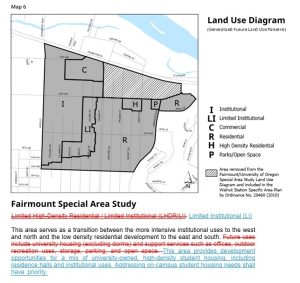Student reps ask 4J for policy changes, more detail about their legal rights
8 min read
Presenter: Eugene high school student representatives share feedback on the district’s new phone policy, ask that food be allowed at affinity group meetings, and ask for more information about their legal rights when stopped by ICE agents. On Feb. 5, 4J School Board Chair Jenny Jonak:
[00:00:18] Jenny Jonak (4J School Board, chair): We will now receive reports from our high school student board reps.
[00:00:23] Deeya Patel (South Eugene): Good evening everyone, and thank you for having us. My name is Deeya and I go to South.
[00:00:28] Cora Ludwig (South Eugene): And I’m Cora.
[00:00:30] Deeya Patel (South Eugene): And then at South right now we’re working through our new phone policy which looks a little different from the one we had last semester. Our new policy states that the freshman classes will have cell hotels that students will keep their phones in until the end of the class.
[00:00:44] With 10th through 12th graders, the policy looks a little different, with more self-responsibility and maturity. In those classrooms, students are just expected to keep their phones and personal devices off and away unless asked differently by teachers.
[00:01:00] Cora Ludwig (South Eugene): And during our principal – student advisory group meetings, we discussed how the food regulations are a little cloudy and preventing affinity groups from accessing an important part of culture—which is food—and that they would like to seek further clarity on those topics.
[00:01:15] Our principal has heard this and arranged for Cameron and Jill to attend one of our principal – student advisory group meetings so we could have a more one-on-one conversation.
[00:01:25] Deeya Patel (South Eugene): And then to end off we would also just like to present our winter formal which is happening this Saturday at the Ford Alumni Center. The theme is ‘Winter Glow’ and you can expect to see lots of beautiful pictures to be posted on the South Eugene and South Eugene Student Government Instagram pages.
[00:01:41] Sheridan Schilling (Churchill): My name is Sheridan Schilling and I am the representative for Churchill High School. Students just finished their semester and we’re currently in our first week of new classes. We’re covering syllabi and meeting our new teachers. It’s exciting.
[00:01:52] Overall, students are reporting a few notable concerns and changes. First, rules do not seem to be enforced. Understanding that discipline of individual students is not something other students are privy to, students still report a lack of respect for rules and the consequences they may have.
[00:02:09] To put it simply, high schoolers feel as if there are no consequences because of this lack of enforcement. Students are also unclear of what violations equate to certain consequences. In-school suspension, out-of-school suspensions, and expulsions are not discussed and shared.
[00:02:24] While this information is in the student handbook, students seldom read it cover to cover, and more importantly, students reported never hearing these consequences implemented. If students knew that vaping in school bathrooms would get them suspended, I believe it wouldn’t be happening on a daily basis.
[00:02:40] If the school district and administration were extremely clear, and more importantly, individual schools were in sync with the district, students would gain a better understanding of guidelines and rules and possibly gain more respect for administrators and set rules.
[00:02:53] Food, and regulations around food as our student reps have already mentioned, is still a very large problem and one that our student leadership has collectively agreed upon. To put it simply, food brings people together and especially high school students.
[00:03:08] This is used as encouragement for attendance at events and creates a community that many report is lacking since this new rule has been implemented. Student government, affinity groups, clubs, and the general student body would love to see a change with this or just some more clarity, as South Eugene mentioned.
[00:03:25] Teacher morale is improving with the coming of our new administration. Their treatment of students and overall attitudes are improving and students are noting more enjoyable interactions with teachers.
[00:03:35] This is likely because we aren’t glued to our cell phones right now because of the cell phone policy, which I think students are actually appreciating, but overall, teacher morale is improving.
[00:03:45] And finally, Churchill’s attendance is gradually and steadily improving, which is very encouraging for our teachers, our new administration, and the overall student body. The administration is tracking this very closely and it’s a step in the right direction.
[00:03:58] Presenter: Representing Early College and Career Options (ECCO) Autumn Thessen:
[00:04:02] Autumn Thessen (ECCO): ECCO currently doesn’t have a report to give, but I still thank you guys for the opportunity.
[00:04:07] Carmen Gonzales Valle (Sheldon): Hi. My name is Carmen Gonzales Valle. I’m a senior at Sheldon and I’m the Sheldon representative.
[00:04:13] So first off I’m a part of Sheldon Cheer and I didn’t join in until my senior year, and I think part of that for me was kind of the negative perceptions associated with Cheer, and it being this sport that, you know, people immediately assume just kind of being dumb, or like the popular, or like the mean girls.
[00:04:31] And I thought that that was my own personal bias but I think that the refusal to give PE credit towards cheerleaders is a reflection of the ideas that kind of limited me from joining Cheer. And I realized that it wasn’t just my internalized bias but an idea rooted in the systems to oppress women. Because although both men and women can do the sports, they are predominantly women’s sports, and I think that it’s kind of important that we try to do more to address this so that all the athletes feel equally valued.
[00:05:00] And then another kind of growing concern at school is the new kind of ICE policies. Although the district has said on their homepage that they will not allow ICE officers inside of the schools, there’s still growing concerns from students of color. And it’s also demonstrating the lack of education from students.
[00:05:17] I think I showed (4J Board Member) Morgan (Munro) a card that students are passing around with student rights. And I feel like that’s kind of just a reflection of the lack of rights. So I think that we should do more as a school district to help quell the concerns of students.
[00:05:31] And so those are the two biggest concerns at schools.
[00:05:34] But then moving on to kind of lighter topics, last Saturday our LSU (Latine Student Union) had their first baile. So like a lot of students from different LSU’s were invited and they had a dance they had paintings and it was just a fun way of showing Latin culture.
[00:05:48] NASU (Native American Student Union) has started gardening several native plants that they’re hoping to splice and give to other NASUs so that’s one of the projects that they’ve been working on.
[00:05:57] GSA (Gender and Sexuality Alliance) has had guests from Lane County’s Lavender Network to help queer students create connections with other queer allies and queer people but also resources.
[00:06:08] And then last week Sheldon wrestling and Sheldon basketball had their own senior nights so that was a great way of recognizing all the hard works of kind of the people who’ve worked hard in the past.
[00:06:18] And then lastly I think the superintendent mentioned that it’s Counselor Appreciation Week, and it just so happens to be one of the busiest weeks for them with having to do scheduling and having to reschedule students’ schedules. So I just wanted to thank all the counselors in this district for working hard to ensure that kind of students are doing well while also trying to maintain their own emotional well-being. So, thank you.
[00:06:42] Katheryn Hehman (IHS): My name is Katheryn Hehman, and I am a junior at South Eugene High School, and I am here today representing the students of South Eugene IHS (International High School).
[00:06:50] As for the lighter stuff that we’ve got going on, IHS just hosted our very own Skate Night, which is a thing where we all go skate at the Rink Exchange. And our Model UN recently competed in Wintercon, which is an online Zoom sort of mock-up of what MUN is going to be like when we go to the U of O. We haven’t gotten the awards back yet as far as I’m aware, but as soon as we do, I will be sure to let you all know about that.
[00:07:20] Okay. The issue I’d like to speak about today is not an IHS issue, but a South Eugene issue. I hate to be contrary to my fellow representative, but I wanted to speak on the SmartPass policy and the new phone policy. Both of these policies are creating a sort of air of discomfort within my school. I believe that my school has a bit of a unique situation considering that just a couple years back we had four bomb threats.
[00:07:52] And because of this, there is a certain leveling of anxiety that permeates my school, especially the older years, the juniors and seniors specifically, who experienced the bomb threats.
[00:08:04] Every time you hear the fire alarm, you see kids, like, snatching at their bags, checking their phones, just so worried that it could be another situation like that. And I think this new phone policy is really affecting those students.
[00:08:21] And it also is just, it feels very, it feels as though students’ voices, students weren’t consulted on these topics. It feels patronizing, especially for the older students. Like, some of the students in our high school, they’re 18 years old, they’re legal adults and yet they’re not allowed to have their phones. It just feels a little reductive.
[00:08:44] Personally, I believe that it would be a perfectly reasonable policy if it only applied to the younger years, so the sophomores and you know everyone down to elementary, that seems reasonable for them, but for us it feels restrictive and just patronizing.
[00:09:01] As for SmartPass, there’s a lot of concerns. It feels like an invasion of privacy for many of the students at the school. We know that it is sort of a testing ground at South Eugene for whether that could be like a district wide policy, I think.
[00:09:16] And we don’t like it. I mean, it’s, it doesn’t work first of all because students can just leave without making a SmartPass, and it is (even if inadvertently) tracking girls’ periods. Thank you so much.
[00:09:31] Lane Lowd (Eugene Online Academy): Hello, I’m Lane Lowd. I represent Eugene Online Academy. And we have no official school report this week, due to our late introduction this year into the school board.
[00:09:51] And I know that you meant no harm just now in almost forgetting our representation, but I feel like that in and of itself represents the fact that we don’t feel fully immersed and represented here yet.
[00:10:10] Presenter: Board Chair Jenny Jonak:
[00:10:13] Jenny Jonak (4J School Board, chair): Thank you for that reminder to make sure that EOA does feel fully incorporated. I really appreciate that. And thank you to all of our student reps for reporting to us.
[00:10:24] Presenter: Eugene high school student representatives discuss student rights when approached by immigration personnel, and share feedback on the phone, SmartPass, and other district policies.




